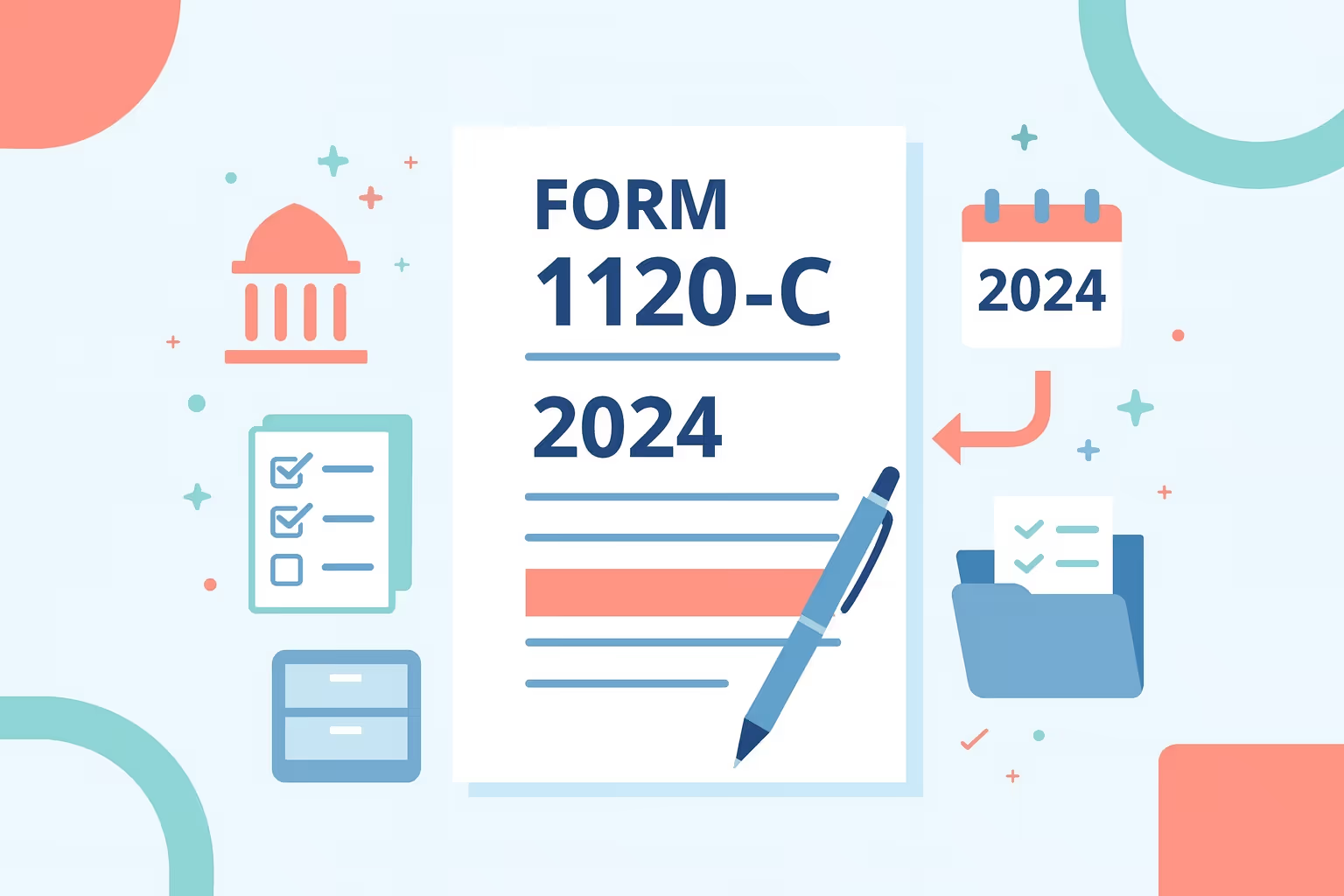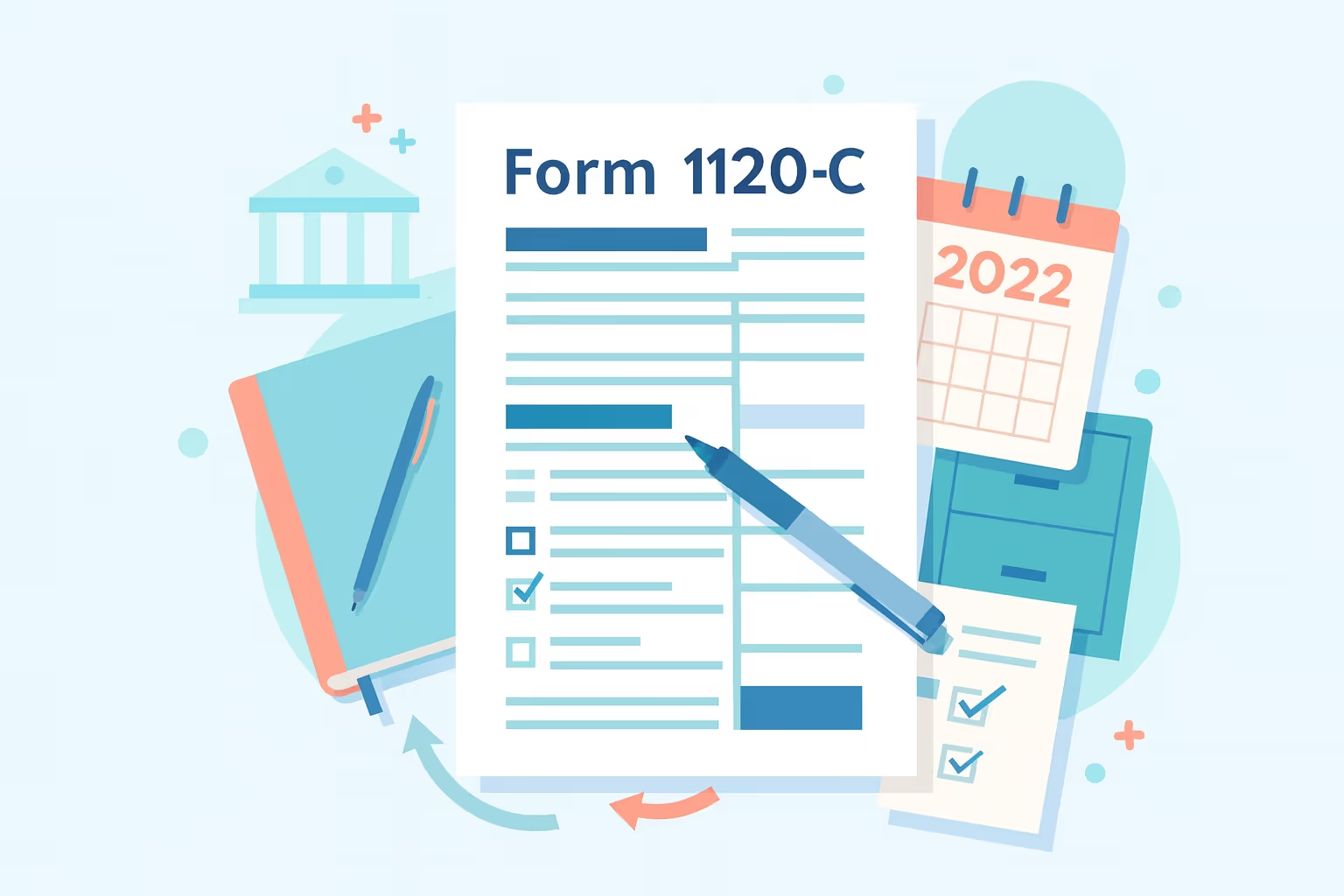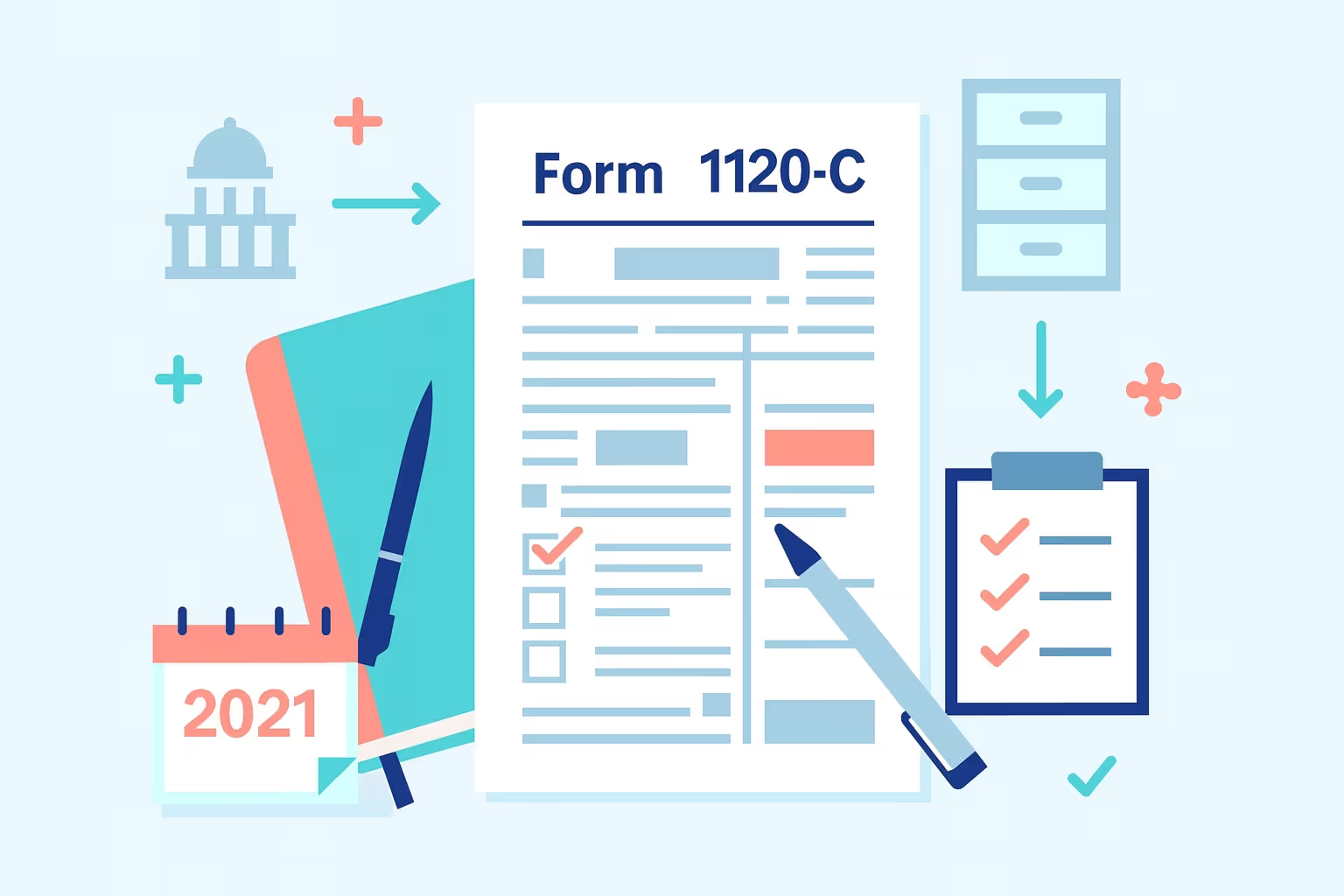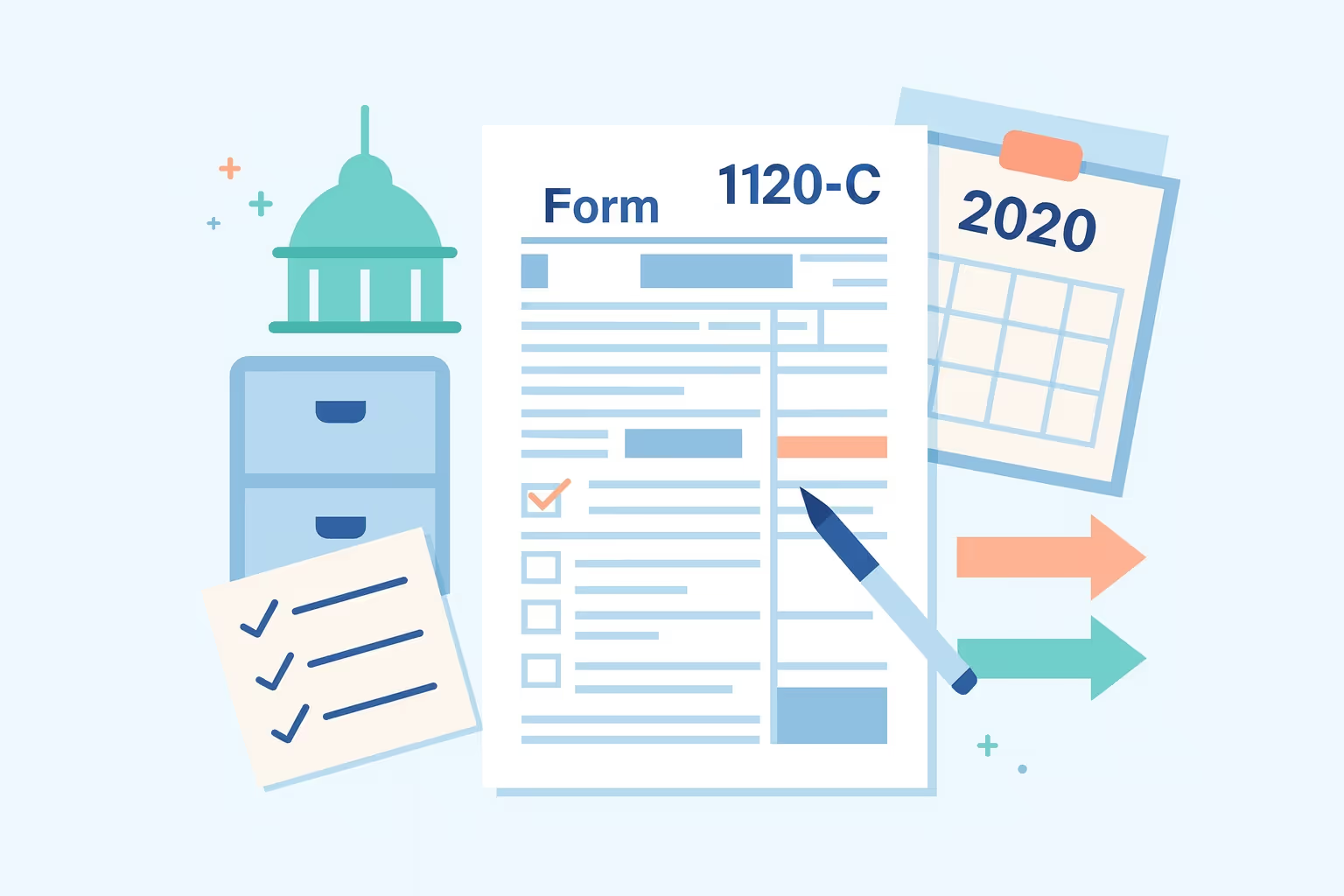
En 2023, el Servicio de Impuestos Internos cobró más de mil millones de dólares en multas a empresas que presentaron sus declaraciones de manera tardía o incorrecta. El riesgo es aún mayor para las asociaciones cooperativas porque los requisitos de presentación son únicos y, a menudo, se malinterpretan. El formulario federal 1120-C para 2024 no es solo otra declaración de impuestos sobre la renta de las sociedades. El documento oficial determina los ingresos imponibles de su cooperativa, su obligación tributaria y su elegibilidad para recibir los beneficios tributarios específicos de la cooperativa. Presentarlo de manera precisa y puntual es esencial para evitar multas innecesarias y proteger la estabilidad financiera de su organización.
Muchas cooperativas, desde las cooperativas de agricultores exentas de impuestos hasta las empresas propiedad de los trabajadores, subestiman lo estrictas que pueden ser las regulaciones tributarias federales. Algo tan pequeño como clasificar erróneamente los ingresos del mecenazgo frente a los ingresos no relacionados con el mecenazgo puede aumentar la obligación tributaria en miles de dólares. Las demoras en la presentación también pueden generar costosos cargos por pagos atrasados y hacer que el procesamiento de los reembolsos se convierta en plazos extremadamente lentos. En resumen, el proceso de presentación es tanto una obligación de cumplimiento como una garantía financiera para sus miembros.
Esta guía ofrece a las asociaciones cooperativas un camino paso a paso para presentar el formulario 1120-C. Destacaremos los cambios introducidos en la legislación tributaria para el año tributario actual, explicaremos cómo declarar correctamente los ingresos y las deducciones y describiremos el proceso de pago y presentación para que pueda cumplir plenamente con los requisitos. Al final, comprenderá cómo presentar una declaración y por qué presentar una declaración anticipada, presentar la declaración electrónicamente y consultar las directrices del IRS o a un profesional de impuestos puede marcar la diferencia entre ahorrar impuestos y cometer errores costosos.
Comprensión del formulario federal 1120-C para el año tributario 2024
Formulario 1120-C es la declaración oficial del impuesto sobre la renta de sociedades para las asociaciones cooperativas. A diferencia de las corporaciones C que presentan el formulario 1120, este formulario del IRS está diseñado específicamente para recopilar los detalles financieros de las cooperativas. Reporta los ingresos brutos, los ingresos ordinarios, las deducciones y otros datos económicos que determinan los ingresos imponibles y la obligación tributaria total de la cooperativa.
Dado que las asociaciones cooperativas operan bajo reglas únicas en el Código de Impuestos Internos, son elegibles para ciertos beneficios tributarios, como la deducción de los dividendos de patrocinio distribuidos a los miembros.
¿Quién debe presentar el formulario 1120-C?
Las asociaciones cooperativas de muchos tipos deben completar este formulario de impuestos federales si tienen ingresos sujetos a impuestos durante el año tributario de su corporación. Estas incluyen:
- Las cooperativas agrícolas proporcionan bienes y servicios a los agricultores o comercializan sus productos. Si cumplen con los estrictos requisitos establecidos por el IRS, a menudo se las trata como cooperativas de agricultores exentas de impuestos en virtud de la Sección 521.
- Las cooperativas de suministros compran y distribuyen productos para sus miembros. Su impuesto sobre la renta empresarial debe declararse cada año, incluso cuando operan a pequeña escala.
- Las cooperativas de consumidores y trabajadores brindan servicios u oportunidades de empleo a sus miembros. A los efectos del IRS, estas entidades son tratadas como sociedades nacionales y deben seguir las normas estándar de tributación corporativa.
La Sección 521 contra las cooperativas que no pertenecen a la Sección 521
Las cooperativas de la Sección 521 reciben beneficios tributarios mejorados porque cumplen con requisitos más estrictos. A las cooperativas que no pertenecen al artículo 521 todavía se les permiten ciertas deducciones del impuesto sobre la renta empresarial, pero se enfrentan a un trato menos favorable en virtud del código tributario.
La Sección 521 contra las cooperativas que no pertenecen a la Sección 521
Sección 521 Cooperativas
- Entidades elegibles: Cooperativas de agricultores exentas de impuestos que cumplen con las pautas de calificación del IRS.
- Beneficios tributarios: Puede deducir los dividendos de las asignaciones de capital social y no mecenazgo pagadas a los miembros.
- Requisitos de presentación: Debe archivar Formulario 1120-C e indique el estado de la Sección 521.
- Supervisión del IRS: Sujeto a una supervisión más estrecha del cumplimiento de Subcapítulo T provisiones.
Cooperativas no incluidas en la Sección 521
- Entidades elegibles: Todas las demás asociaciones cooperativas que no cumplan con los requisitos de la Sección 521.
- Beneficios tributarios: Limitado a deducciones por dividendos de mecenazgo únicamente.
- Requisitos de presentación: También debe archivar Formulario 1120-C, pero con arreglo a las normas tributarias cooperativas estándar.
- Supervisión del IRS: Se rige por las normas generales de tributación corporativa sin exenciones especiales.
Qué hay de nuevo en el año tributario 2024
Los cambios en la legislación tributaria para 2024 introducen mayores riesgos para las cooperativas que presenten el formulario 1120-C. El Servicio de Impuestos Internos ha actualizado los montos de las multas, ha agregado una reducción para ciertos impuestos estimados y ha perfeccionado las hojas de trabajo que afectan directamente a los cálculos de la renta imponible. La comprensión de estas actualizaciones garantiza que la declaración de impuestos sobre la renta de su cooperativa sea precisa y cumpla con los requisitos.
Sanciones más altas por presentación tardía
El IRS ha aumentado la multa mínima por no presentar una declaración de impuestos sobre la renta corporativa con más de 60 días de retraso. Para los años tributarios que comiencen en 2024, la multa es de 510 dólares o el impuesto no pagado, lo que sea menor. Este ajuste subraya la importancia de cumplir con los requisitos y plazos de presentación.
Reducción del impuesto mínimo alternativo corporativo (CAMT)
El nuevo impuesto mínimo alternativo corporativo ha creado desafíos para muchas empresas, incluidas las asociaciones cooperativas. Para facilitar la transición, el IRS exime de aplicar multas específicas a los pagos de impuestos estimados mal pagados vinculados a Responsabilidad CAMT. Sin embargo, las cooperativas aún deben demostrar esfuerzos razonables para cumplir con las pautas del IRS al hacer los impuestos estimados.
Hoja de trabajo actualizada del Programa C
La hoja de trabajo de deducción por dividendos recibidos del Anexo C se actualizó para reflejar los cálculos de la Sección 250. Estas revisiones afectan la forma en que las cooperativas declaran los ingresos y determinan las deducciones permitidas. No seguir la hoja de trabajo revisada puede resultar en una sobreestimación de los ingresos imponibles y en una mayor obligación tributaria.
Requisitos de presentación electrónica
Las regulaciones tributarias federales ahora exigen la presentación electrónica de las corporaciones que presenten 10 o más declaraciones durante el año tributario. Las cooperativas que reúnen los requisitos deben presentar electrónicamente el formulario 1120-C, a menos que obtengan una exención del Servicio de Impuestos Internos. La presentación electrónica reduce los errores y proporciona una confirmación más rápida del cumplimiento tributario.
Proceso de presentación paso a paso para el formulario 1120-C
La presentación del formulario federal 1120-C para el año tributario 2024 implica varias etapas. Cada paso requiere informes precisos y una revisión cuidadosa para evitar errores costosos. Dividir el proceso de presentación en partes manejables permite a las asociaciones cooperativas cumplir con las pautas del IRS y reducir el riesgo de sanciones.
Paso 1: Complete la información básica
El proceso de presentación comienza con los detalles identificativos:
- Introduzca el nombre legal, la dirección y el número de identificación del empleador (EIN) de la cooperativa. Cada detalle debe coincidir con los registros del IRS para evitar demoras en el procesamiento.
- Indique el año tributario de la corporación, ya sea un año calendario o fiscal. Determinar mal el año tributario de la corporación puede crear problemas de cumplimiento.
- Marque si la presentación es una declaración inicial, enmendada o final. Si los activos totales superan los 10 millones de dólares, las cooperativas también deben tener en cuenta los requisitos del anexo M-3 o sobre el estado de la declaración consolidada.
Paso 2: Reportar los ingresos
Se deben registrar todos los ingresos de la empresa. Las cooperativas deben separar cuidadosamente los ingresos por mecenazgo de los no mecenazgo.
- Los ingresos brutos y las ventas se enumeran primero, y es posible que se requiera que el Anexo A muestre los costos directos y los bienes vendidos. Los errores en esta sección distorsionan los cálculos de las ganancias brutas.
- Indique los ingresos por inversiones, como dividendos, ingresos por intereses y ganancias de capital. Estos montos suelen influir de manera significativa en los ingresos totales y en la obligación tributaria.
- También se deben revelar otros ingresos, incluidos los dividendos de mecenazgo recibidos. Esto garantiza una clasificación precisa en virtud de la legislación tributaria cooperativa.
Paso 3: Calcular las deducciones
Las deducciones reducen los ingresos imponibles y reducen el impuesto sobre la renta empresarial de la cooperativa. Las deducciones comunes incluyen:
- Los salarios, los salarios pagados a los empleados y la compensación de los funcionarios se consideran gastos de ingresos ordinarios y están totalmente permitidos por el código tributario.
- Las contribuciones caritativas se pueden deducir, siempre que cumplan con las regulaciones del IRS y estén dentro de los límites porcentuales aplicables.
- Se puede deducir la depreciación de los activos y gastos comerciales de los programas de beneficios para empleados. Estas deducciones suelen proporcionar a las cooperativas ahorros fiscales significativos.
- También se deben informar las deducciones de la Sección 199A (g) asignadas a los clientes. Esta deducción es exclusiva de las asociaciones cooperativas y debe calcularse con precisión para cumplir con las regulaciones tributarias federales.
Paso 4: Complete el Programa H
El Anexo H se aplica solo a las cooperativas y es fundamental para la tributación corporativa en virtud del subcapítulo T.
- Informe los dividendos de patrocinio, las asignaciones de retención por unidad y las distribuciones de efectivo a los miembros. Cada cifra debe coincidir con los registros de los miembros para evitar el escrutinio del IRS.
- Las cooperativas de la Sección 521 pueden deducir los dividendos de las asignaciones de capital social y no relacionadas con el patrocinio. Este beneficio tributario no está disponible para las cooperativas que no pertenecen a la Sección 521.
- Adjunte toda la documentación de respaldo. No proporcionar cálculos precisos en el Anexo H es uno de los errores de presentación más comunes que señala el IRS.
Paso 5: Determinar la obligación tributaria
Una vez que se aplican las deducciones, se calcula la renta imponible. Este paso determina el impuesto total adeudado.
- El Anexo J calcula el impuesto sobre la renta, los créditos y otros impuestos. Las cooperativas deben asegurarse de que cada cifra se refiera a los estados financieros.
- Aplica créditos comerciales generales o créditos fiscales extranjeros cuando corresponda. Cada crédito reduce la obligación tributaria de la cooperativa en materia de impuestos sobre la renta.
- Se deben restar los pagos de impuestos estimados realizados a lo largo del año. Es posible que se adeuden montos adicionales si el impuesto del año anterior no se pagó lo suficiente.
Paso 6: Métodos de presentación (presentación electrónica o en papel)
Las cooperativas deben decidir cómo presentar su declaración de impuestos.
- Se requiere la presentación electrónica si la cooperativa presenta 10 o más declaraciones. Las declaraciones presentadas electrónicamente suelen procesarse con mayor rapidez, lo que reduce los plazos de reembolso a 30 días o menos.
- Se permite la presentación en papel para las cooperativas más pequeñas o para aquellas a las que se les haya otorgado una exención. Sin embargo, la presentación en papel puede ser tremendamente lenta, y los reembolsos suelen tardar 8 semanas o más.
- Asegúrese de que todas las páginas de devolución incluyan el EIN, estén firmadas por un oficial autorizado y estén organizadas de acuerdo con las instrucciones del IRS.
Presentación electrónica o presentación en papel para el formulario 1120-C
Presentación electrónica
- Tiempo de procesamiento: Presentación inmediata.
- Riesgo de error: Más bajo, gracias a los controles de validación electrónicos.
- Plazo de reembolso: Normalmente se procesa en unos 30 días.
- Confirmación del IRS: Sí, se proporciona confirmación electrónica.
Archivado en papel
- Tiempo de procesamiento: Tarda varias semanas.
- Riesgo de error: Más alto, debido a la entrada manual de datos.
- Plazo de reembolso: A menudo 8 semanas o más.
- Confirmación del IRS: No hay confirmación electrónica; solo hay una prueba de envío disponible.
Instrucciones de pago y pagos de impuestos estimados
Presentar el formulario federal 1120-C para el año tributario 2024 es solo una parte del proceso. Las cooperativas también deben asegurarse de que todos los pagos requeridos se realicen de manera correcta y puntual. No pagar la cantidad adecuada puede generar multas que aumentan mensualmente hasta que se resuelva el pago del impuesto pendiente de pago.
Plazos de pago
Las corporaciones que operan en un año calendario deben realizar pagos trimestrales de impuestos estimados. Cada cuota vence el día 15 del cuarto, sexto, noveno y duodécimo meses del año tributario de la corporación. El pago debe enviarse antes del siguiente día hábil si la fecha de vencimiento coincide con un fin de semana o un feriado legal. El incumplimiento de los plazos expone a las cooperativas a multas por pagos atrasados en virtud de las regulaciones tributarias federales.
Cómo pagar electrónicamente a través de EFTPS
El Sistema electrónico de pago de impuestos federales (EFTPS) es el método de pago más seguro para el Servicio de Impuestos Internos.
- Los pagos pueden programarse por adelantado y procesarse directamente desde la cuenta bancaria de la cooperativa. Esto reduce el riesgo de demoras en el procesamiento y proporciona una confirmación inmediata.
- El EFTPS está disponible las 24 horas del día, los 7 días de la semana, lo que permite a las cooperativas hacer ajustes de última hora antes de los plazos. El sistema también registra todas las transacciones para consultarlas y auditarlas en el futuro.
Multas por impuestos impagos y pagos atrasados
Se aplican multas si una cooperativa no paga puntualmente su obligación tributaria sobre la renta.
- La multa estándar es del 0.5 por ciento del impuesto no pagado por cada mes o parte del saldo pendiente. Esto puede aumentar hasta el 25 por ciento de la obligación tributaria total.
- Los intereses se acumulan además de las multas, lo que agrava la carga financiera. Estos costos adicionales pueden ser perjudiciales para las cooperativas que ya operan con márgenes reducidos.
Plazos de reembolso por sobrepagos
Si los impuestos estimados superan los ingresos imponibles de la cooperativa, la cooperativa puede tener derecho a un reembolso.
- Los reembolsos se procesan mucho más rápido para las presentaciones electrónicas, a menudo en un plazo de 30 días.
- Las presentaciones en papel pueden retrasar los reembolsos durante 8 semanas o más, lo que puede afectar el flujo de caja de la cooperativa.
- Si se solicitan en la declaración de impuestos sobre la renta, los reembolsos se pueden aplicar a los pagos de impuestos estimados del año siguiente.
Cronogramas y anexos requeridos
La presentación del formulario federal 1120-C para el año tributario 2024 requiere más que la declaración principal. Las cooperativas deben adjuntar cronogramas específicos que proporcionen desgloses detallados de ingresos, deducciones y asignaciones. Los cronogramas faltantes o incompletos son algunos de los motivos más comunes por los que el Servicio de Impuestos Internos retrasa el procesamiento o emite avisos de penalización.
Horarios siempre requeridos
Se deben incluir cronogramas específicos en cada presentación:
- Anexo C — Dividendos y deducciones especiales: Este formulario tributario calcula las deducciones permitidas de las sociedades nacionales, las sociedades extranjeras y los dividendos de acciones financiadas con deuda. Los errores en este sentido pueden llevar a exagerar los ingresos imponibles y a inflar la obligación tributaria.
- Anexo G — Asignación de ingresos: Este cronograma separa los ingresos por mecenazgo y los no mecenazgo. La clasificación adecuada garantiza el cumplimiento de las normas tributarias federales y determina la elegibilidad para recibir los beneficios tributarios específicos de las cooperativas.
- Anexo H — Deducciones cooperativas: Este programa registra los dividendos de mecenazgo, las asignaciones de retención por unidad y las asignaciones no relacionadas con el mecenazgo distribuidas a los miembros. Es una de las formas más importantes de asociación cooperativa según el subcapítulo T.
Horarios requeridos condicionalmente
Algunos horarios se aplican solo en determinadas situaciones:
- Si los activos totales de la cooperativa superan los 10 millones de dólares, se debe presentar el Anexo M-3. Esto reconcilia los ingresos contables con los ingresos imponibles y, a menudo, es un requisito para las grandes corporaciones que operan en varios estados.
- Formulario 4626 se aplica si la cooperativa está sujeta al nuevo impuesto mínimo corporativo alternativo. Ignorar este requisito puede crear problemas de cumplimiento en virtud de las normas de tributación corporativa.
Otros posibles archivos adjuntos
Según las actividades comerciales, es posible que también se necesiten otros formularios:
- Formulario 3800 es obligatorio cuando una cooperativa solicita créditos comerciales generales, lo que le permite aplicar varios créditos a su obligación tributaria total.
- Formulario 1118 debe presentarse si una cooperativa solicita créditos fiscales extranjeros. Esto se aplica cuando las transacciones internacionales dan como resultado el pago de impuestos a gobiernos extranjeros.
- Formulario 5472 es necesario para informar los detalles de propiedad y las transacciones que involucran a sociedades extranjeras relacionadas con la cooperativa.
- Los anexos adicionales pueden incluir costos directos, cronogramas de depreciación y estados financieros. Estos documentos respaldan los montos declarados en la declaración de impuestos sobre la renta principal.
Errores comunes y cómo evitarlos
Incluso las cooperativas con experiencia pueden cometer errores al presentar el formulario federal 1120-C para el año tributario 2024. Estos errores suelen provocar multas innecesarias, retrasos en los reembolsos o una mayor obligación tributaria. Comprender los problemas más frecuentes ayuda a garantizar el cumplimiento tributario y un proceso de presentación más fluido.
Clasificación errónea de los ingresos por mecenazgo frente a los ingresos no relacionados con el mecenazgo
Uno de los errores más comunes consiste en confundir los ingresos por mecenazgo y los no mecenazgo. Los ingresos por mecenazgo se relacionan directamente con los negocios realizados con los miembros, mientras que los ingresos no relacionados con el mecenazgo incluyen los ingresos por inversiones o las relaciones con personas que no son miembros. La clasificación incorrecta aumenta los ingresos imponibles de la corporación y puede reducir las deducciones permitidas. Las cooperativas deben mantener registros precisos y consultar las directrices del IRS para evitar este error.
Errores en los cálculos del Anexo H
El Anexo H es fundamental para registrar las deducciones específicas de las cooperativas. La declaración errónea de los dividendos de mecenazgo, las asignaciones de retención por unidad u otras distribuciones de cooperativas puede aumentar las obligaciones tributarias sobre la renta de las empresas. Cada cifra debe coincidir con los registros y estados financieros de los miembros. Es esencial verificar estos montos antes de enviarlos.
EIN inexacto o faltante
Otro error frecuente es introducir un número de identificación del empleador incorrecto o no incluirlo en todos los cronogramas adjuntos. El IRS se basa en la verificación del EIN para hacer coincidir las declaraciones con los registros tributarios. Omitir o declarar erróneamente el número puede retrasar el procesamiento y, potencialmente, provocar verificaciones de cumplimiento.
Reclamaciones de estado incorrectas de la Sección 521
Algunas cooperativas reclaman por error el estatus de la Sección 521 sin cumplir con los estrictos requisitos del IRS. Presentar el formulario 1120-C con un estado incorrecto expone a la cooperativa a multas, impuestos atrasados y cargos por intereses. Verificar la elegibilidad en virtud de la ley tributaria federal antes de solicitar el estatus de la Sección 521 evita problemas a largo plazo.
Presentación de solicitudes para declarantes sin actividad o por primera vez
No todas las cooperativas tienen un año de actividad activo, pero generalmente es necesario presentar el formulario federal 1120-C para el año tributario 2024. Las cooperativas que permanecen registradas legalmente pero inactivas deben presentar una declaración incluso si no tuvieron ingresos, gastos o distribuciones durante el año tributario de la corporación. Los requisitos de presentación se aplican hasta que la entidad se disuelva formalmente según la ley estatal.
Requisitos de presentación de cero actividad
Una cooperativa que declara cero ingresos y cero deducciones debe completar la información de identificación básica y presentar la declaración. Incluso las empresas del año calendario que no tengan actividad no pueden saltarse este proceso. No presentar la declaración se traducirá en multas incluso si no existe ninguna obligación tributaria. El IRS considera que la falta de presentación es una falta de cumplimiento, no una acción neutral.
Reglas cooperativas inactivas y proceso de disolución
Las cooperativas inactivas pueden suspender sus operaciones pero permanecer legalmente activas. En esta situación, deben seguir presentando el formulario 1120-C cada año hasta la disolución. La disolución requiere una declaración final, la distribución de los activos restantes y la presentación del formulario 966 ante el Servicio de Impuestos Internos. La cooperativa sigue siendo responsable de declarar los impuestos sobre la renta de las empresas sin este proceso formal.
Lista de verificación para quienes declaran por primera vez
La presentación de la primera declaración de impuestos sobre la renta requiere una preparación cuidadosa para las asociaciones cooperativas recién formadas.
- Reúna los documentos de la organización, como los artículos de incorporación, los estatutos y la confirmación del número de identificación del empleador. Estos establecen la identidad legal de la cooperativa.
- Recopile los estados financieros, incluidos los balances, los ingresos y los libros de contabilidad general. Incluso si la actividad es mínima, se requieren registros para respaldar la declaración.
- Prepare registros detallados de transacciones de mecenazgo y cálculos de dividendos. La clasificación correcta de los ingresos por mecenazgo y no mecenazgo garantiza el ahorro tributario y el cumplimiento de las regulaciones tributarias federales.
- Considere consultar a un profesional de impuestos si hay dudas sobre el estado de la Sección 521, los pagos de impuestos estimados o las deducciones específicas de la cooperativa.
Preguntas frecuentes
¿Cuál es la fecha límite para presentar el formulario federal 1120-C para el año tributario 2024?
Para las corporaciones de un año calendario, la fecha límite de presentación es el 15 de septiembre de 2025. Esta fecha representa el día 15 del noveno mes después del final del año fiscal de la corporación. El formulario de presentación debe enviarse el siguiente día hábil si la fecha límite cae en un fin de semana o un feriado legal. No cumplir con la fecha límite de presentación puede conllevar multas y reducir los posibles ahorros tributarios para la cooperativa.
¿Pueden las cooperativas solicitar una prórroga?
Las cooperativas pueden presentar el formulario 7004 para solicitar una prórroga de seis meses para presentar su declaración de impuestos sobre la renta de las sociedades. Sin embargo, esta extensión solo se aplica a la presentación y no cubre las obligaciones de pago de impuestos. Todas las obligaciones tributarias sobre la renta aún deben pagarse antes de la fecha de vencimiento original. No hacerlo puede resultar en multas e intereses, incluso si la declaración de impuestos sobre la renta se presenta dentro del plazo extendido.
¿Cómo se declaran los dividendos de mecenazgo en la declaración de impuestos sobre la renta?
Los dividendos de mecenazgo deben declararse en el Anexo H del formulario 1120-C. Las cooperativas los separan de los ingresos brutos porque se distribuyen en función de la actividad de los miembros. Cuando están debidamente documentados, estos montos son deducibles, lo que reduce la renta imponible y la obligación tributaria total de la corporación. La presentación de informes precisos garantiza el cumplimiento de las directrices del IRS y evita errores que podrían provocar auditorías o retrasar el procesamiento de la declaración de impuestos de la cooperativa.
¿Las sociedades de responsabilidad limitada presentan el formulario 1120-C?
No, las sociedades de responsabilidad limitada (LLC) no presentan el formulario 1120-C a menos que elijan pagar impuestos como sociedades anónimas y calificar como cooperativas según la ley tributaria federal. En la mayoría de los casos, las LLC utilizan otros formularios según la clasificación fiscal que hayan elegido. Solo las asociaciones cooperativas que operan bajo el subcapítulo T deben presentar el formulario 1120-C. Siempre es recomendable consultar a un profesional de impuestos si el estado de la empresa o los requisitos de presentación no están claros.
¿Qué pasa si mi cooperativa no presenta la solicitud?
No presentar el formulario 1120-C a tiempo resulta en multas e intereses significativos. El IRS puede imponer multas por presentación tardía a partir de 510 dólares o el impuesto no pagado, lo que sea menor. Las multas por pagos atrasados añaden otro 0.5 por ciento mensual a la obligación tributaria impaga. Además, los intereses se acumulan hasta que el saldo se pague en su totalidad. Los requisitos de presentación se aplican incluso cuando no se declara ningún ingreso bruto durante el año tributario.
























